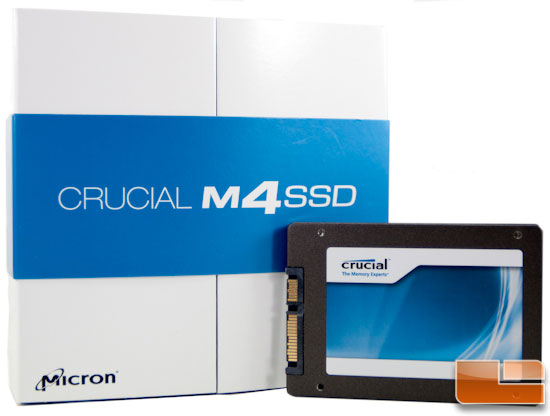Crucial M4 / Micron C400 256GB SSD Review
Crucial m4/Micron C400 – Two Names, One Drive
Crucial, best known for their memory products, was the first to put an SSD on the market with a 6Gbps interface way back in early 2010 with the C300 drive. Back then, we ran some tests and found it to be impressive when compared to what was on the market at the time with its 355 MB/s reads and 215 MB/s writes. Since then, a lot has changed and there are a number of 6Gbps drives on the market now so competition is definitely stiffer this time around. For clarification, the naming of the drive can be a little confusing between Crucial and Micron. Crucial drives will carry the moniker of m4 while the Micron model name is C400. Both are the same drive with different branding and successor to what most people know as the C300 drive we referenced above. For the purposes of the article and simplicity’s sake, we’ll refer to the drive as the Crucial m4.

As you may have expected if you’ve been keeping up with the newest drives, the controller driving the m4 is essentially the same architecturally as its predecessor, but obviously some firmware changes have taken place if for nothing else but to support the 25nm NAND on board. The 256 GB drive we received arrived in attractive packaging but without any of the literature, etc. the retail packaging would include.

The m4 will be available in several capacities from 64 GB to 512 GB and all should be available this month. Crucial finalized pricing this week, so 64 GB, 128 GB, 256 GB and 512 GB
SSD’s will retail for $129.99, $249.99, $499.99 and $999.99,
respectively. Our 256 GB drive rated for up to 415 MB/s reads and 260 MB/s writes which is a little behind that of the Intel 510 Series drive which uses the same Marvell controller – although the m4 utilizes eight channels while the Intel uses ten. Obviously, the firmware employed by each differs and the benchmarks will bear out how they perform in comparison.
| Crucial M4 SSD 2.5″ | CT064M4SSD2 | CT0128M4SSD2 | CT0256M4SSD2 | CT0512M4SSD2 |
| Capacity (Unformatted) | 64 GB | 128 GB | 256 GB | 512 GB |
| NAND | Micron MLC | Micron MLC | Micron MLC | Micron MLC |
| Controller | Integrated 8-channel single chip | Integrated 8-channel single chip | Integrated 8-channel single chip | Integrated 8-channel single chip |
| RAID Support | Yes | Yes | Yes | Yes |
| Firmware | Field Upgradeable | Field Upgradeable | Field Upgradeable | Field Upgradeable |
| SATA Transfer Rate | 6Gb/s (3Gb/s compatible) | 6Gb/s (3Gb/s compatible) | 6Gb/s (3Gb/s compatible) | 6Gb/s (3Gb/s compatible) |
| Sequential Read (up to) | 415 MB/sec | 415 MB/sec | 415 MB/sec | 415 MB/sec |
| Sequential Write (up to) | 95 MB/sec | 175 MB/sec | 260 MB/sec | 260 MB/sec |
| Random 4k READ | 40,000 IOPS | 40,000 IOPS | 40,000 IOPS | 40,000 IOPS |
| Random 4k WRITE | 20,000 IOPS | 35,000 IOPS | 50,000 IOPS | 50,000 IOPS |
| PCMark Vantage | 55K HDD test score | 55K HDD test score | 65K HDD test score | 65K HDD test score |
| Dimensions (L x W x H) |
100.5 x 69.5 x 9.50 mm | 100.5 x 69.5 x 9.50 mm | 100.5 x 69.5 x 9.50 mm | 100.5 x 69.5 x 9.50 mm |
| Weight | 75g | 75g | 75g | 75g |
| MTBF | 1.2 Million Hours | 1.2 Million Hours | 1.2 Million Hours | 1.2 Million Hours |
| Data Reliability | Built-in EDC/ECC | Built-in EDC/ECC | Built-in EDC/ECC | Built-in EDC/ECC |
| Drive Endurance | 36TB=20GB per day for 5 years | 72TB=40GB per day for 5 years | 72TB=40GB per day for 5 years | 72TB=40GB per day for 5 years |
| Warranty | Limited 3 Year Warranty | Limited 3 Year Warranty | Limited 3 Year Warranty | Limited 3 Year Warranty |

The design of the exterior is not all that different from the original version with a simple design sticker on the front and the rear featuring a sticker with all of the drive information and legal verbiage. No flashy lights or bling here.

Let’s have a look inside.

Comments are closed.